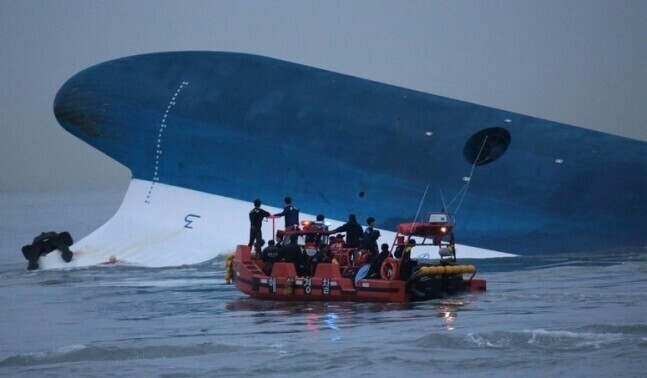hankyoreh
Links to other country sites 다른 나라 사이트 링크
[Editorial] Former S. Korean coast guard officials not held legally responsible for Sewol rescue failure in first trial

The former leaders of the South Korean Coast Guard who were charged with causing the deaths of passengers aboard the Sewol ferry through negligence in their initial response to the ferry accident were acquitted by a district court. On Feb. 15, Kim Seok-kyun, former head of the Coast Guard, and eight other people responsible for maritime rescues were found not guilty of negligent homicide by the 22nd criminal division of the Seoul Central District Court.
Kim and the other defendants were put on trial in February 2020 on the charge of causing the deaths of 303 passengers and the injury of 142 others by failing to take the necessary precautions in rescue operations on the Sewol, the ferry that went down on Apr. 16, 2014. It’s unclear whether this ruling will be palatable to the South Korean public — not to mention the victims’ family members, who are still in pain seven years after the accident.
The biggest question in the trial was whether Kim and the others accurately gauged the circumstances at the scene so that they could direct an evacuation and enter the ship within the “golden time” when a rescue would be most effective.
The court concluded that it was “difficult for the defendants to perceive at the time of the accident that sinking was imminent and that the situation demanded the captain to take immediate measures to evacuate the ship.”
It also said that it “did not appear that the defendants could have foreseen a situation in which the Sewol crew members took no action whatsoever with regard to the passengers.” The court determined that it would not have been possible for the Coast Guard leaders to make a precise judgment and decision in light of the overall circumstances.
There appears to be a lot of room for questioning the appropriateness of this court’s ruling in higher courts going forward.
In particular, it seems too presumptuous for the court to have concluded that there was a “strong likelihood that even if the defendants had communicated directly with the Sewol’s captain and crew members and ordered them to prepare to abandon ship, they would have ignored the orders or simply reiterated that they had made an evacuation announcement.”
This indicates a rather strict yardstick applied to the matter of the defendants’ criminal liability — in which case the inferences about what did not happen should have been equally strict. Hopefully, the prosecutor’s special investigation team for the Sewol tragedy will respond with sturdier legal principles in the second trial.
The court did say that the defendants “could be censured for managerial responsibility in terms of their not having a system in place to prepare for the eventuality of a large-scale fatal accident.” This conclusion should be noted as pointing out the general lack of material and staffing capabilities within the Coast Guard.
The Sewol tragedy offers a vivid illustration of the general lack of interest, competence and responsibility when it comes to safety in South Korea. It’s time to ask whether the government really has improved its systems and capabilities enough to protect its citizens’ lives and safety if another maritime accident like this were to occur — or whether South Korea is really so safe now that there would never be another tragedy like the Sewol sinking.
Please direct comments or questions to [english@hani.co.kr]

Editorial・opinion
![[Editorial] Intensifying US-China rivalry means Seoul must address uncertainty with Beijing sooner than later [Editorial] Intensifying US-China rivalry means Seoul must address uncertainty with Beijing sooner than later](https://flexible.img.hani.co.kr/flexible/normal/500/300/imgdb/original/2024/0517/8117159322045222.jpg) [Editorial] Intensifying US-China rivalry means Seoul must address uncertainty with Beijing sooner than later
[Editorial] Intensifying US-China rivalry means Seoul must address uncertainty with Beijing sooner than later![[Column] When ‘fairness’ means hate and violence [Column] When ‘fairness’ means hate and violence](https://flexible.img.hani.co.kr/flexible/normal/500/300/imgdb/original/2024/0516/7417158465908824.jpg) [Column] When ‘fairness’ means hate and violence
[Column] When ‘fairness’ means hate and violence- [Editorial] Yoon must stop abusing authority to shield himself from investigation
- [Column] US troop withdrawal from Korea could be the Acheson Line all over
- [Column] How to win back readers who’ve turned to YouTube for news
- [Column] Welcome to the president’s pity party
- [Editorial] Korea must respond firmly to Japan’s attempt to usurp Line
- [Editorial] Transfers of prosecutors investigating Korea’s first lady send chilling message
- [Column] Will Seoul’s ties with Moscow really recover on their own?
- [Column] Samsung’s ‘lost decade’ and Lee Jae-yong’s mismatched chopsticks
Most viewed articles
- 1[Editorial] Transfers of prosecutors investigating Korea’s first lady send chilling message
- 2Celine Song says she’s gratified global audiences have responded to the kismet of ‘inyeon’
- 3[Exclusive] Unearthed memo suggests Gwangju Uprising missing may have been cremated
- 4For new generation of Chinese artists, discontent is disobedience
- 5[Column] US troop withdrawal from Korea could be the Acheson Line all over
- 6Could Korea’s Naver lose control of Line to Japan?
- 7Xi, Putin ‘oppose acts of military intimidation’ against N. Korea by US in joint statement
- 8Yoon ridicules critics of Fukushima dumping in first comments since release began
- 9Five Ukrainians share how their lives have changed two years into war
- 10[Editorial] Intensifying US-China rivalry means Seoul must address uncertainty with Beijing sooner t